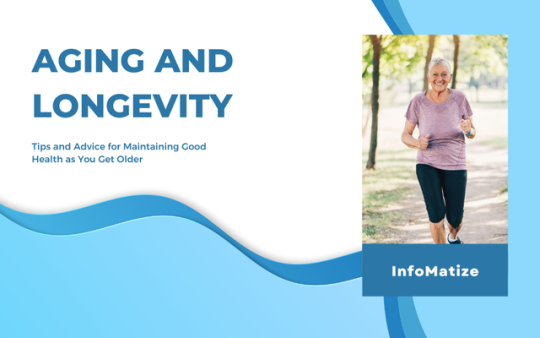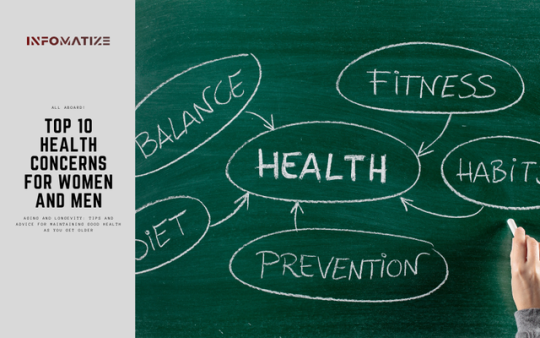#Age-relatedhealthadvice
Explore tagged Tumblr posts
Text
Aging and Longevity: Tips and Advice for Maintaining Good Health as You Get Older

Introduction
As we age, taking care of our physical, mental, and cognitive health becomes increasingly important for healthy aging. Fortunately, making even small changes in our daily lives can help us live longer and better. Here are some tips and advice for maintaining good health as you get older: - Stay active: Regular physical activity, like walking, jogging, biking, swimming, or aerobics, can help prevent, delay, and manage chronic diseases; improve balance and stamina; reduce the risk of falls; and improve brain health 4. Aim for moderate physical activity, like walking, for at least 150 minutes a week and muscle strengthening activity, like carrying groceries, for at least 2 days a week . - Eat well: A healthy diet can help you maintain a healthy weight, lower your risk of chronic diseases, and boost brain health. Aim to eat a balanced diet with plenty of fruits, vegetables, whole grains, and lean proteins. Swap out white bread for whole grain and add fibre-rich foods to your meals, like kidney beans and apples . - Get enough sleep: Getting enough sleep is important for your physical and mental health. Most adults need 7-8 hours of sleep per night to feel rested and alert. Try to establish a regular sleep schedule and create a relaxing bedtime routine . - Visit your doctor regularly: Regular check-ups with your doctor can help you manage any health conditions and prevent future ones. Make sure to follow recommended screening guidelines for your age and sex, and talk to your doctor about any health concerns you may have . - Manage stress: Chronic stress can have negative effects on your health. Finding ways to manage stress, like meditation or exercise, can help improve your mental and physical health . - Stay socially engaged: Social isolation can have negative effects on your mental and physical health. Try to stay connected with friends and family, join a social group or club, or volunteer in your community . - Avoid risky behaviours: Smoking, excessive drinking, and substance abuse can have negative effects on your health. Avoiding these risky behaviours can help you maintain good health as you age . By following these tips and advice, you can help maintain good health as you get older and improve your chances of healthy aging. Remember, it's never too late to make positive changes to your lifestyle and take steps to improve your overall well-being.
The Importance of Gender-Specific Healthcare

Gender-specific healthcare is crucial for promoting the health and well-being of individuals, particularly women and gender-diverse individuals. Gender refers to the socially constructed characteristics, norms, behaviours, and roles associated with being a woman, man, girl, or boy, which can vary across societies and change over time . Research shows that gender norms, roles, and relations, such as gender inequality and inequity, affect people's health all around the world . For instance, gender-affirming healthcare has been shown to improve the mental health and overall well-being of gender-diverse people . Moreover, promoting primary healthcare for women can improve the health and economic well-being of the population as a whole . However, less than 30 per cent of medical schools incorporate gender-specific topics in their curriculum, and only 9 per cent of medical schools offer women's health . Gender bias in health research is an ongoing issue, and gender-specific needs are important to address. However, a gendered approach may ignore people who identify as neither and risk creating new biases . To address these challenges, specialized, gender-specific care is becoming more common, and comprehensive women's health centres are developing quality care for women . However, there is a need for more attention to how sex and gender influence healthcare, including providing sex/gender-specific information on any topic . In summary, gender-specific healthcare is crucial for promoting the health and well-being of individuals, particularly women and gender-diverse individuals. However, a gendered approach should not ignore people who identify as neither, and there is a need for more attention to how sex and gender influence healthcare . It is important to address gender-related barriers to healthcare, advance gender equality and the empowerment of women and girls in all their diversity, and achieve health for all . Understanding Gender Differences in Health Gender differences play a significant role in health outcomes and healthcare access, and it is important to understand these differences to achieve equitable health outcomes for all. Sex and gender are different concepts, where sex is biological and gender is a social or cultural construct . Gender norms, roles, and relations can affect people's health globally, and gender-related barriers to healthcare must be addressed to advance gender equality and empower women and girls in all their diversity . Medical schools, however, are not adequately addressing the issue of gender differences in health. Despite women making up 50% of the population, only 44% of medical schools have women's health curricula, and even fewer offer interdisciplinary training . The lack of attention to gender differences in medical education can lead to gender bias in healthcare, which can have serious consequences, including fatal outcomes . The FDA has recognized the importance of understanding gender differences in clinical drug evaluations and has issued guidance on the study and evaluation of gender differences in the clinical evaluation of drugs . It is critical to recognize that gender differences can impact health outcomes and access to healthcare, and addressing these differences must be a priority to ensure equitable health outcomes for all. How Hormones Impact Women's Health Hormones play a crucial role in women's health. Estrogen and progesterone, which are mainly produced by the ovaries, are the primary female hormones that affect a variety of bodily systems . Estrogen, in particular, promotes the development of female characteristics and regulates bone health and mood management . However, fluctuations in hormone levels, such as during menopause, can lead to various symptoms, such as hot flashes and vaginal discomfort, which can be treated with hormone therapy . In addition to their effects on reproductive and bone health, hormones can also impact mental health. The stress hormone cortisol, along with reproductive hormones like estrogen and progesterone, can cause anxiety, depression, and irritability . It is important for women to have open and honest conversations with their primary care providers about the impact of hormones on their overall health and well-being. Hormone therapy can be an effective treatment option for certain symptoms, but it is not without risks. Women should weigh the potential benefits and risks with their healthcare providers to determine the best course of action for their individual needs. Addressing Men's Health Concerns Men's health concerns can vary depending on age, lifestyle, and genetics. It is important for men to prioritize their health and regularly seek medical attention to address any concerns. Common health concerns for men include heart disease, cancer, unintentional injury, obesity, and mental health issues . Men may feel embarrassed or uncomfortable discussing certain health issues with their healthcare providers. However, it is crucial to openly communicate and seek treatment to prevent and address potential health problems . Men of colour may face additional health disparities due to poverty, violence, incarceration, and limited access to healthcare services . Healthcare providers can help men address multiple health concerns, such as addressing underlying health conditions that may contribute to erectile dysfunction . By maintaining a healthy lifestyle, seeking regular check-ups, and promptly addressing any health concerns, men can maintain optimal health and well-being .
Preventative Healthcare for Women and Men

Preventative healthcare is crucial for both women and men to maintain overall health and prevent diseases. The Affordable Care Act requires most health insurance plans to cover certain preventative care services for both genders without any out-of-pocket costs . Here are some preventative care measures that women and men can take to stay healthy: For Women: - Cervical cancer screening, including Pap smears and HPV DNA tests, every three years for women aged 21-65 years - Breast cancer screening, including mammograms and breast exams, every 1-2 years for women aged 40 years or older - Osteoporosis screening for women aged 65 years or older and for younger women with certain risk factors - Contraceptive counselling and FDA-approved contraceptive methods without cost-sharing for women of reproductive age - Routine gynaecological exams for women of all ages For Men: - Blood pressure screening and cholesterol screening for men of certain ages or at higher risk - Colorectal cancer screening for men aged 45-75 years - Prostate cancer screening, including PSA blood tests and digital rectal exams, for men aged 50 years or older and for younger men with certain risk factors - Testicular exams for young men to check for lumps or abnormalities It's important to talk to a healthcare provider to determine which preventative care measures are appropriate for an individual's specific health needs and risk factors. By getting recommended preventative care, women and men can reduce their risk of developing diseases and improve their overall health and well-being. The Importance of Regular Screenings Regular screenings are an essential part of preventive healthcare . Screenings are tests that are done to detect the presence of a disease or a health condition in individuals who may not be showing any symptoms . These screenings can help identify health issues early on when they are typically easier to treat and can prevent further complications from developing . There are various types of screenings available, and the recommended screening schedule can vary depending on an individual's age, gender, and overall health status . Some common types of preventive healthcare screenings include breast cancer, cervical cancer, colon cancer, lung cancer, and skin cancer screenings, as well as cholesterol and blood pressure screenings . Routine screenings can help healthcare providers monitor changes in an individual's health over time, allowing them to identify potential issues and intervene early on with medications or lifestyle changes to prevent more severe problems from developing . It is essential to follow the recommended screening schedule for your age and gender and discuss any concerns or questions with your healthcare provider . By regularly attending screenings and following recommended health guidelines, individuals can take a proactive approach to their health and reduce the risk of developing serious health conditions later on in life. Lifestyle Factors that Affect Women's Health The lifestyle choices that women make can have a significant impact on their overall health and well-being. Here are some lifestyle factors that can affect women's health: - Weight: Being overweight or underweight can affect women's health, including fertility . - Smoking: Smoking is a major risk factor for many health problems, including cancer and heart disease. Women who smoke are at increased risk for infertility, pregnancy complications, and menopause-related issues . - Physical activity: Regular physical activity is important for overall health and can help prevent chronic conditions such as heart disease, diabetes, and osteoporosis. Physical activity can also help improve mental health and reduce stress . - Diet: A healthy diet that includes a variety of fruits, vegetables, whole grains, lean proteins, and healthy fats is important for maintaining overall health and reducing the risk of chronic diseases such as heart disease, cancer, and diabetes . - Alcohol consumption: Excessive alcohol consumption can lead to a range of health problems, including liver disease, cancer, and mental health issues. Women are more susceptible to the harmful effects of alcohol than men due to differences in body size and metabolism . - Sleep: Getting enough sleep is important for overall health and well-being. Sleep deprivation can affect mood, and cognitive function, and increase the risk of accidents and chronic health problems . - Sexual health: Maintaining good sexual health is important for overall health and well-being. Women can reduce the risk of sexually transmitted infections (STIs) by practising safe sex, getting tested for STIs, and getting vaccinated against HPV . - Stress management: Chronic stress can have negative effects on both physical and mental health. Women can reduce stress by practising relaxation techniques such as deep breathing, yoga, or meditation, and by seeking support from friends, family, or a mental health professional . In conclusion, there are several lifestyle factors that can affect women's health. By making healthy choices and practising self-care, women can reduce their risk of developing chronic health conditions and improve their overall well-being. Mind-Body Approaches to Men's Health The mind-body approach refers to the techniques that aim to enhance the positive impact of the mind on the body, including behavioural, psychological, social, expressive, and spiritual approaches . While the majority of the search results address mind-body approaches for reducing stress, anxiety, and depression, there is no indication that these practices are gender-specific. Therefore, they can also be used to enhance men's health. Mind-body techniques such as meditation, guided imagery, breathing techniques, autogenic training, biofeedback, genograms, and self-expression through drawings and movement have been found to improve well-being and reduce stress in both men and women . Furthermore, research suggests that mindfulness-based meditation can have positive effects on depression as well, and its effects can last for six months or more . Therefore, men who experience symptoms of depression can benefit from practising mindfulness-based meditation. In addition, some studies have found that mind-body approaches, such as relaxation techniques, yoga, tai chi, and meditation, may be useful for managing symptoms of stress in patients, including men . The Integrative Medicine and Health Research Program at Mayo Clinic studies the effectiveness of using mind-body techniques to reduce anxiety before and during medical procedures, improve the quality of life for patients and caregivers, and help people manage stress . Therefore, men may benefit from incorporating mind-body practices into their health routines to improve their overall well-being.
Top 10 Health Concerns for Women and Men

There are several health concerns that are common among women and men, but some of these conditions affect each gender differently. Here are the top 10 health concerns for women and men Top 10 Health Concerns for Women: - Breast Cancer - Women are at a higher risk for breast cancer than men. Regular mammograms and breast self-exams can help with early detection and treatment . - Heart Disease - Women may have different symptoms than men when it comes to heart disease. Risk factors include high blood pressure, high cholesterol, diabetes, smoking, and a family history of heart disease . - Stroke - Women are more likely to have a stroke than men. Symptoms include sudden weakness on one side, loss of speech and balance, and confusion . - Depression - Women are more likely to experience depression than men, and suicide is a leading cause of death for women under 60. It is important for women to seek assistance and treatment for mental health issues . - Osteoporosis - Women are at a higher risk for osteoporosis, a condition where bones become weak and brittle than men. Regular exercise and a diet rich in calcium and vitamin D can help prevent osteoporosis . - Autoimmune Diseases - Women are more likely than men to develop autoimmune diseases such as lupus, rheumatoid arthritis, and multiple sclerosis . - Pregnancy-Related Issues - Racial disparities exist in pregnancy-related deaths, and surveillance of hypertension among women of reproductive age is important . - Thyroid Disorders - Women are more likely than men to develop thyroid disorders such as hypothyroidism and hyperthyroidism. Symptoms include weight gain or loss, fatigue, and changes in the mood . - Urinary Tract Infections - Women are more likely to develop urinary tract infections (UTIs) than men due to the anatomy of the female urinary tract. Symptoms include painful urination and frequent urination . - Reproductive Health - Women may experience issues related to their reproductive health, such as infertility, polycystic ovary syndrome (PCOS), and endometriosis . As men age, they face a variety of health concerns that can affect their quality of life and even be life-threatening. Here are the top 10 health concerns for men, according to various reputable sources: - Heart disease: This is the leading cause of death in men over 50 and can be caused by smoking, obesity, high blood pressure, and high cholesterol . Men should watch for warning signs, such as discomfort or pain in the chest, shortness of breath, and lightheadedness or fainting . - Cancer: Men are at risk for several types of cancer, including lung, prostate, and colorectal cancer. Regular screenings and early detection are crucial for successful treatment . - Unintentional injuries: Men are more likely to engage in risky behaviours, such as driving under the influence or not wearing a seatbelt, which can lead to unintentional injuries . - Stroke: Men have a higher risk of stroke than women, and risk factors include high blood pressure, high cholesterol, smoking, and diabetes . - Respiratory diseases: Chronic obstructive pulmonary disease (COPD) and other respiratory diseases are more common in men than in women, and smoking is a major risk factor . - Diabetes: Men with diabetes are at risk for lower testosterone levels and sexual impotence, and they are also more likely to develop heart disease . - Mental health: Men are less likely to seek help for mental health issues, but depression and suicide are significant concerns. Men should talk to their healthcare provider if they are experiencing symptoms of depression . - Erectile dysfunction: As men age, they may experience difficulty achieving or maintaining an erection. Read the full article
#Adviceforalongandhealthylife#Adviceforagingwell#Age-relatedhealthadvice#Agingandbalancetips#Agingandbrainhealthtips#Agingandexercisetips#Agingandhearinghealthtips#Agingandhearthealthtips#Agingandlongevitytips#Agingandmobilitytips#Agingandnutritiontipsforseniors#Agingandrespiratoryhealthtips#Agingandsleeptips#Agingandwellnesstips#Aginggracefullytips#Anti-agingfoods#Anti-agingstrategies#Australia#Austria#Belgium#Canada#Denmark#Finland#France#Germany#Healthyagingadvice#Healthyaginghabits#HongKong#Ireland#Italy
0 notes